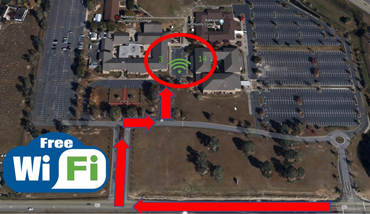 WiFi: Part of our name is ‘Community’ SHELBY – The shift to online classes has revealed anew North Carolina’s digital divide. So, because North Carolina community colleges also tend to have plenty of parking lots that can accommodate social distancing, several colleges set out to help bridge that divide for their students and their communities. “We know that rural broadband access in Cleveland County is not that great,” said Jonathan Davis, the Chief Information Officer at Cleveland Community College. Especially in northern reaches of the county, he said, access is often limited to satellite services with capped data. As they contemplated moving classes online, college officials made a list of local fast-food restaurants and Starbucks stores where students could get WiFi, Davis said. But then came the order for restaurants to close their dining rooms. “That changed the game,” he said. “How were we going to get access to them if they couldn’t go into McDonald’s or Taco Bell, that sort of place?” So – in collaboration with the Cleveland County Schools, which were establishing WiFi hot spots at local K-12 schools – the college established a hot spot in its employee parking lot. K-12 students are free to use the community college lot, and community-college students can use hot spots at K-12 schools. “They just go to the location convenient to them,” Davis said. Whether through their cellular service, a neighbor’s WiFi, the community college or K-12 schools, he said, “We feel like most students are going to get access somehow.” Beyond an Internet connection, though, college officials also saw a need for a human one. So they established a Care Team of more than 50 faculty and staff who contact every student at least once a week to make sure they’re doing their work, using Blackboard, and are engaged in their studies. Officials also established a list of places to turn if students need something as basic as food or help with a power bill. Especially on social media, “The college got a lot of very good feedback from the community,” Davis said. IN LUMBERTON, Robeson Community College took similar action. It created “The Learning Lot,” a WiFi parking lot open to both students and the public that is monitored by campus security. As college officials discussed creation of the lot, said information-technology instructor Clifton Oxendine, someone asked whether access should be limited to the college’s students or the public should be allowed as well. “Part of our name is ‘Community,’ so why wouldn’t we?” replied President Melissa Singler. Community colleges generally serve a lower-income student population than universities do. So some colleges have tried to equip students not just with access, but with devices they need for online classes. In addition to providing masks, gowns, foot covers and hosting a blood drive, Caldwell Community College and Technical Institute loaned 75 Chromebooks donated by Google for students to use. And the Mitchell Community College Foundation provided students with an additional $150 grant to help buy devices. Read more >> |